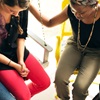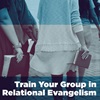Community is a buzzword often heard these days in the church. The problem is that we can use it so much that it loses its meaning. Let's look at what the Bible says about it through the lenses of Authentic Biblical Community (ABC), and then examine how to develop it in your small group ministry.
ABC. It's Easy As 1-2-3.
- The apostle Paul described the church as the body of Christ in which all the members work together, belong to each other, and need one another. That's Authentic Biblical Community!
- The apostle John described the church as a spiritual family that deeply loves one another. That's Authentic Biblical Community!
- The apostle Peter described the church as "living stones" that God is building into His holy temple. That's Authentic Biblical Community!
Small groups can be an incredible expression of community, but here is the problem: A great small group meeting does not necessarily equal Authentic Biblical Community. ABC is more than a meeting, more than a Bible study, more than a feeling. (I know … another old Rock 'n Roll reference. I just can't help myself.)
ABC goes back to the very nature of God. He exists in community, yearns to have community between Himself and us, and desires for us to have Authentic Biblical Community with one another (see John 17 and 1 John 1:1-3).
ABC was the design for how Jesus discipled the twelve and carried out His earthly ministry. Jesus was the cornerstone on which the church was established, but Authentic Biblical Community was the foundation on which He built it.
ABC is the building blocks on which we reach the lost, grow spiritually, and develop leaders in the church. Authentic Biblical Community is not the purpose or focus, but simply the environment in which we carry out our mission to make disciples of all nations, one relationship at a time.
So how can you make sure your group is in Authentic Biblical Community? It's easy as A-B-C!
A— Is It Authentic?
Have you seen the Budweiser commercials featuring Leon, the star football player? In the first commercial, a reporter asks Leon about his team's loss. Leon says, "This is a team game, and I put this loss squarely on the shoulders of my supporting cast." The reporter then asks, "You don't think your four fumbles played a part in the loss?" Leon responds, "Not if those guys fell on the ball. Once again, Leon can't do everything!" Then, in perfect deadpan, the reporter says, "There's no 'I' in team." To which Leon answers, "There ain't no 'we' either." And then the tagline comes up: "TRUE."
This might sound odd, but I wish more Christians were more like Leon. He's selfish and egotistical, but at least he's true. He's authentic. What you see is what you get.
Unfortunately, many Christians are not so true. In his book, Life Together, Dietrich Bonhoeffer, says that as believers, we are often afraid of admitting our sin within our Christian community, so we remain alone in our sin. This is true even when we are in a small group. Christians show up to church on weekends, and to groups during the week, wearing masks hiding their pain, fears, failures, and sin. Because they stand alone in their sin, they do not change and they do not grow.
Authentic Biblical Community is true. It's designed to be a place where we …
- accept one another
- are devoted to one another
- forgive each other
- submit to one another
- bear with each other
- admonish one another
- confess our sins to each other
- love one another deeply
Are the members of your group becoming increasingly true with one another? As you study the early church, you see people who were authentic with one another (see Acts 2:42-47; 4:32-37 for instance). Inauthenticity could and would not be tolerated. At the first hint of people not being true (Ananias and Sapphira, Acts 5:1-11), God brought severe consequences which brought about a real sense of awe in the community (v. 11).
As a leader, you must model authenticity. You must go first. You've got to be real. Here are three ideas for the leader to make the small group setting conducive for authenticity:
- Subgroup for prayer time. In smaller groups, people tend to be more transparent. My group often breaks out by men with men and women with women. Leaders, of course, must take their masks off first in these subgroups.
- Allow time in meetings for people to tell their stories and to share what's going in their lives. Again, the leader goes first.
- Spend time together outside of meetings. Outside of official meeting times is often when people first break down the barriers and take off the masks. They get to know one another in social settings and begin to trust one another more.
B— Is It Biblical?
We must define community by the Bible's standards, not our society's opinion. We see the world's definition of community all the time — on TV shows such as "Friends" and "Scrubs," for instance. But Biblical community is much more than that. Biblical community can be defined by the community Jesus had with His disciples or the community the early church had with one another.
Here is an essential principle from Scripture for understanding Biblical community: A Biblical small group does not exist for community; it exists in community for spiritual growth. Discipleship is our only real purpose.
As Jesus brought His disciples together, He said, "Follow Me and I will make you into fishers of men." Following Jesus meant entering into community with Him and the other disciples. The purpose was discipleship. Jesus brought them into the community in order to disciple, develop and finally to send them out to do the same with others.
The Great Commission is given in the midst of community. Community is the bookends of the commission stated in Matthew 28. Most of us have memorized verses 18 and 19, but the verses preceding and following these are about community. First, verse 16 states that the eleven disciples went to Galilee and joined Jesus on the mountain there. Later, in verse 20, Jesus promises that He would be with them always. He would remain in community with them "to the very end of the age," even though He was about to leave them physically.
There was a definite purpose, process, and mission involved in the community that Jesus modeled for His followers. For our community to be Biblical, this should be true for our small groups as well.
C— Is It Community?
Real spiritual community is more than just a bunch of friendly people; it is real friends who stick even closer than a brother or sister (Proverbs 18:24).
Spiritual community, as opposed to secular community, always includes Jesus and comes together in His name (for His purposes) (Matt. 18:20). In this kind of community, God works through each member by His power and love.
It is in real spiritual community that people change. A core value for the church where I serve is that people grow best in small groups. That is only true if those groups are living in community that is authentic and Biblical.
Put It Into Action
Assess your level of Authentic Biblical Community using the "one anothers" in the New Testament, the examples of Jesus' small group, or the early church in the Book of Acts as your standard.
- Admit as a group that you fall short of the Biblical standard and determine to change.
- Believe that God can build Authentic Biblical Community in your group.
- Build community by planning activities outside of meetings that help deepen relationships. Start spending more spontaneous time together.
- Communicate more often and at deeper levels. Get beyond what people think and move on to how people feel.
- Care for one another …
- Genuinely Be real …
- Unconditionally No matter what …
- Tangibly In deed, not just words …
- Sacrificially Even if it costs you.
That might take GUTS, but that's Authentic Biblical Community!










